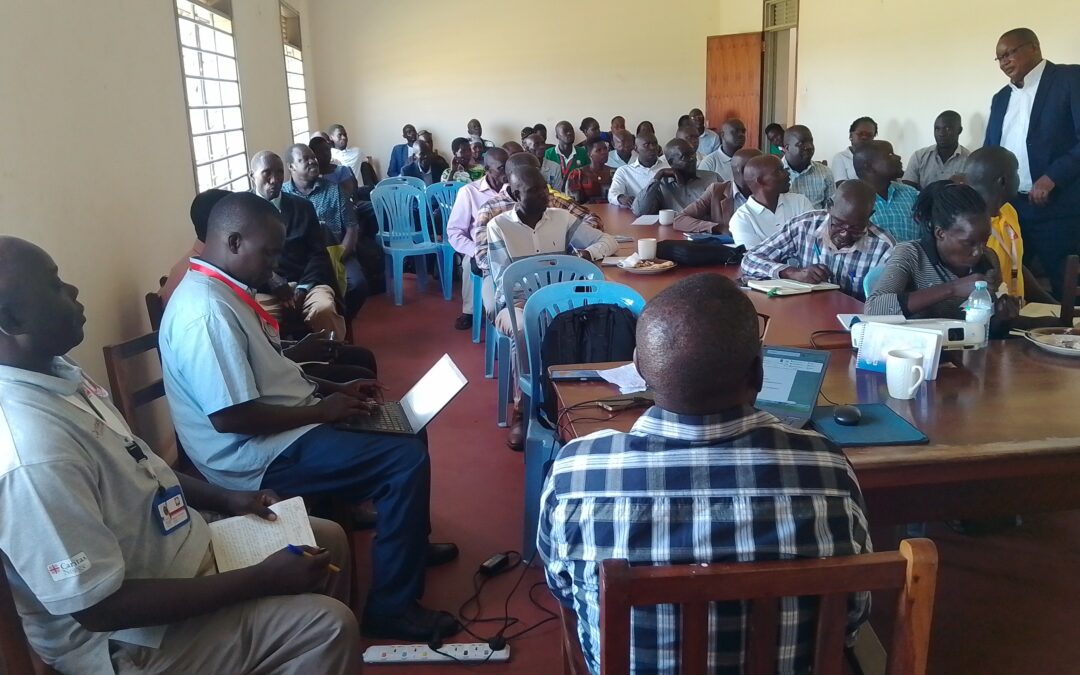By Flavia Oyuu, Communications Office, Lira Diocese
At a regional stakeholders meeting hosted by Caritas Lira, district leaders, agricultural experts and community representatives urged farmers in Lango Sub-Region to shift from dependency on government inputs and embrace irrigation, high-value fruit crops and stronger farmer groups as the surest path to overcoming poverty and climate shocks.
Farmers in Lango Sub-Region have been urged to stop relying solely on government seed and input handouts and instead begin with the little resources they have as they work toward long-term agricultural growth.
This call was made by Okello Thomas, the Lira District Production Officer, during a stakeholders’ meeting on Water for Production (FILP II) Year III held at the Caritas Lira offices at St Daniel Comboni, Bar Ogole.
Okello stressed that the fight against poverty starts at home.
“Farmers must start small with what they have. Government support may come, but it is often not enough and waiting wastes time,” he said.
He encouraged farmers to move away from low-income traditional crops and adopt high-value, long-term enterprises such as cocoa, coffee, and Hass avocado. He also called on religious, political, cultural, and technical leaders to lead by example by planting at least one acre of fruit trees, assuring that communities would follow suit.
Breaking down the figures, he noted that a single acre of coffee can earn between UGX 12–18 million, far more than many common crops currently grown in the region.
Expanding Access to Irrigation Programs
Godfrey Onentho Otii, Head of Research and Innovations at Caritas Uganda, explained that the meeting brought together district leaders, sub-county political leaders and other stakeholders to reflect on how farmers can meaningfully access irrigation programs offered by both government and private actors.
He observed that while many irrigation schemes exist, very few farmers in Lango are benefiting, partly due to limited awareness and coordination.
Among the programs highlighted were:
- Ugift Micro-Scale Irrigation Scheme (co-funded at 25% farmer contribution, 75% government), now concluded but expected to return.
- Toshi Irrigation Scheme, which has land available to support thousands of farmers for year-round production.
Onentho said the meeting resolved to strengthen collaboration between the Church, local governments and Caritas in promoting irrigation, crucial in the face of climate change that continues to disrupt rain-fed agriculture.
He added that the government will supply coffee seedlings to the Northern Region next year, and forms are already available.
He urged farmers to apply early and emphasized that seedlings must be planted, not sold, noting that an acre requires 450–500 seedlings.
Project Achievements in Food Security and Livelihoods
Presenting project accomplishments, Francis Ojok, Project Manager at Caritas Lira, said the initiative aims to improve food security and household livelihoods in Northern Uganda.
Key objectives include increasing production, improving market access, strengthening environmental practices and promoting accountable community leadership.
Project reach and demographics:
- 6,322 direct beneficiaries
- 3,851 female (61%)
- 2,471 male (39%)
- 316 persons with disabilities (190 female, 126 male)
- 210 farmers supported in hard-to-reach areas
The project operates in Oyam, Alebtong, Dokolo and Otuke districts, each with 30 farmer groups in selected sub-counties.
Notable outcomes include:
- 5,048 farmers trained by agronomists
- 14 community seed multiplier groups supported toward certification
- Widespread training on IPM, nutrient-rich foods, and kitchen gardens
- Establishment of Community-Based Animators (CBAs)
- 75.8% of trained farmers now growing micro-nutrient foods
- 75.9% eating three meals a day
- 3,593 reporting improved dietary scores
- 76% eating diverse foods
- Water quality test kits provided through Hague Agua
- Training for fish pond farmers; two ponds (Bata and Okwalongwen) harvested
Challenges Still Hindering Progress
Ojok noted persistent challenges including:
- Heavy rains submerging gardens
- Poor sanitation and unsafe water
- Damaged road networks
- Limited access to water for production
- Land rights disputes
- Middlemen distorting markets
- Long processes for local seed multiplication
- Political activities disrupting trainings
Voices from the District Leaders
Rev Fr. Desiderius Pule, Director of Caritas Lira, reminded participants that water is now a precious and unreliable resource as rainfall patterns change, making irrigation the essential path forward to sustain agricultural productivity.
Ogwal Albino Coks, Oyam District Production Officer, urged farmers to join cooperatives to strengthen their bargaining power against middlemen who often book crops prematurely and cause losses.
He also updated the meeting on the Toshi Irrigation Scheme (1,240 acres), noting that despite initial enthusiasm, farmers were discouraged by floods and later rat infestations that destroyed mature rice. The district is now using chemicals and encouraging farmers to clear and re-cultivate the plots.
Stories of Impact from the Farmers
Acio Janet from Ogenrwot Group, Aber Sub County (Oyam), testified that Caritas training has improved both her farming and family life, even helping reduce domestic violence. Her group now has a water tank but still needs a solar pump and other support for irrigation.
Obwon Silvanus from Alango Sub County (Otuke) shared that after receiving training, he ventured into cabbage and rice. With the proceeds, he bought 2 acres of land for UGX 4 million, opened a mobile money business, and now supports his child’s education while keeping poultry and livestock.


Recent Comments